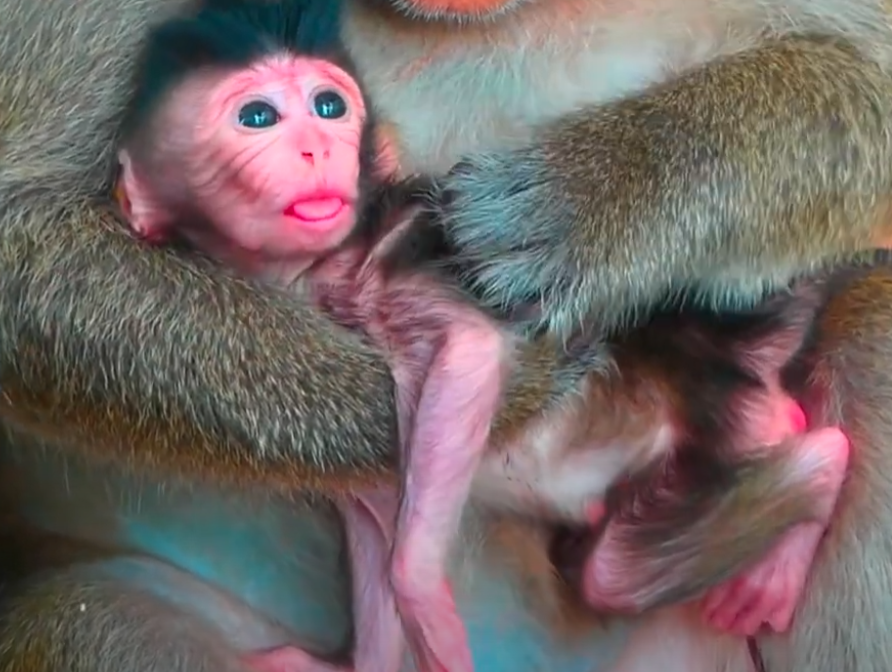

The forest canopy of Angkor Wat was alive with morning sounds—chirping birds, rustling leaves, and the playful chatter of monkeys beginning their daily routines. But today… that harmony was broken.
I was standing near a cluster of banyan roots, watching a young mother groom her tiny newborn, who couldn’t have been more than a few days old. His eyes were barely open, his fur still soft and patchy, and his tiny hands clutched his mama’s stomach with instinctive trust. They were a portrait of peace—until chaos shattered the moment.
From the dense upper branches came a sudden crack of limbs—and in a flash, a large male monkey burst downward. He wasn’t from their group. His fur was darker, and his face marked with scars, a sign of past aggression. Within seconds, he lunged.
I froze. The young mother shrieked, her cries echoing like a warning bell across the jungle. She clung to her baby, wrapping her arms tighter, but the male’s force was unmatched. In one devastating moment, he yanked the baby from her chest.
The infant screamed—a raw, high-pitched cry of terror—and the mother chased desperately, leaping across branches, risking everything. But he was too fast. The large male had already scrambled to a distant tree, clutching the baby awkwardly, as if the child were nothing more than a prize.
It was a kidnapping. A brutal, instinct-driven act seen in the wild more often than we care to admit. Older males, especially those struggling for dominance, sometimes take young from other groups to provoke, assert, or intimidate.
But this wasn’t dominance—it felt personal.
The way he held that baby… it wasn’t safe. The infant dangled, shoulder twisted unnaturally as the male climbed higher and higher. His grip wasn’t secure—it was dangerous. The baby monkey screamed again, his limbs flailing, and I saw it—his shoulder had been yanked violently out of position. He was hurt.
The mother hadn’t given up. She howled and called out, not just to the abductor, but to the entire troop. Her cries echoed through the forest.
Then something I’ll never forget happened.
From the shadows, her group emerged. Older females, a few brave males—together, they surrounded the tree where the kidnapper perched. They didn’t attack outright, but they made noise—piercing shrieks, aggressive tail flicks, stomping the branches. They created a wall of warning.
The kidnapper grew anxious. He knew he was outnumbered now.
In a careless panic, he flung the baby toward a nearby tree, trying to toss him aside to escape. The infant hit a thin branch hard—his body limp, his tiny arm flopped unnaturally. For a moment, he didn’t move.
Everyone held their breath.
Then, from below, his mother sprinted upward like a spark catching fire. She caught him just before he slipped again. She held him. Close. Tight. Her body trembled as she inspected his arm. His shoulder was swollen and bruised, but he was alive.
Tears welled up in my eyes.
The forest slowly settled back into silence. The kidnapper had vanished. The other monkeys returned to their trees. But the young mother—she sat in the crook of a giant fig tree, rocking her baby like a human mother would. His cries softened into quiet whimpers as he pressed his face into her chest.
I couldn’t move. I couldn’t look away.
This wasn’t just nature being nature. This was heartbreak. Pain. Fear. Resilience. A mother’s determination against all odds. That baby nearly died—because of power, jealousy, or rage. Whatever the motive, the cost was almost too great.
Back at my camp that evening, I played the video I’d captured. The sounds—the screaming, the crash, the desperate cries—still echo in my mind. And I thought of that mother, holding her injured baby beneath the moonlight, while the forest whispered around them.
To witness something like this… it changes you.
You realize how fragile life is—how raw and vulnerable these moments are, even in the animal kingdom. Love, loss, fear—they’re not just human experiences. They belong to all creatures… especially a mother and her baby.
If you’re reading this now, I hope you’ll look at monkeys differently. They are not just wild animals. They’re families. And their stories—like this one—deserve to be heard.